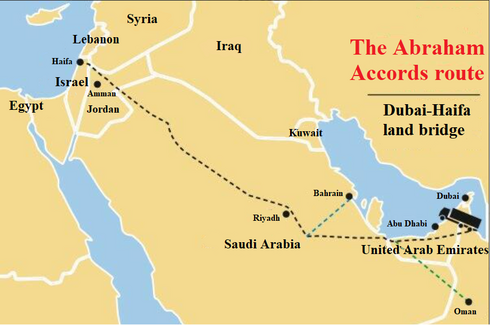Jordan’s Transportation Ministry denied reports that a land route for shipments from the Arabian Gulf to Israel, via Jordan to bypass the Houthi blockade, according to Jordan’s state news agency.
On Saturday, Walla reported that a pilot for a new land route for trucks to travel from the ports in Dubai through Saudi Arabia and Jordan to Israel had been completed successfully and that the first ten trucks of the initiative had completed the route.
The so-called Land Bridge project to connect the ports of Dubai in the UAE and Haifa in Israel by truck and train, enhancing and protecting trade routes in the Middle East, is not a new idea.
The land bridge agreement was spearheaded last July by Israeli logistics firm Trucknet, in collaboration with UAE-based counterpart Puretrans FZCO, as well as DP WORLD, a Dubai-headquartered port enterprise,
The route is aimed at preventing Yemen’s Iran-backed Islamist Houthi movement from hijacking and targeting commercial vessels with drones and missiles in the Red Sea.
Since Israel declared war on Hamas on October 7, the Houthis have attacked multiple cargo ships traveling in some of the world’s most important shipping lanes, claiming that they are Israeli-owned.
The new route will connect the UAE to Haifa through Saudi Arabia and Jordan and will travel in both directions. It is estimated to reduce transit time by 80 percent compared to maritime routes and follows the 2020 Abraham Accords, which normalized relations between Israel and the UAE, Morocco, and Bahrain.
The new project has been endorsed by the Israeli Ministry of Defense .
“This development significantly contributes to the promotion of trade and the acceleration of economic expansion in the Middle East, while also establishing Israel as a pivotal international trade hub,” Hanan Friedman, CEO of Trucknet, was quoted as saying.
“The prevailing security challenges impacting international trade in the Red Sea necessitate a secure and efficient continental alternative characterized by high standards and competitive pricing,” he added.
“This route not only offers an 80% reduction in transit time compared to maritime routes but also provides a cost-effective solution with appealing transport durations, facilitated by a foremost logistics entity in the Emirates in collaboration with DP WORLD.” He went on to say.
According to analysts the problem for the Gulf states is Iran. While the Gulf countries have been busy building their economy based on trade and Tourism which requires stability, Iran has been busy building a war economy to increase its destabilizing role in the region.
The main reason Saudi Arabia agreed to normalize its relations with Iran was to end the Houthi presence in Yemen and reunite the country under its legitimate government, analysts told Ya Libnan. But the Houthis continued their destabilizing role in the region.
“As far as the Gulf is concerned Iran is the number one enemy, and these countries are willing to deal with the devil to counter Iran’s Destabilizing role “, the analyst added


Leave a Reply
You must be logged in to post a comment.